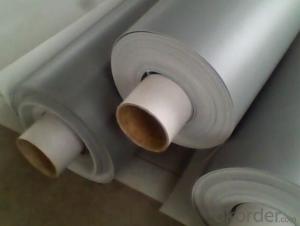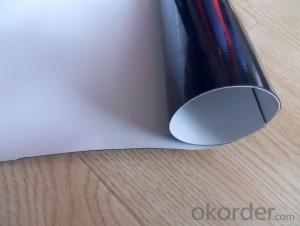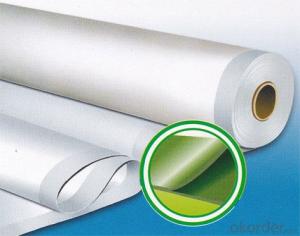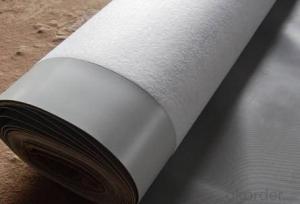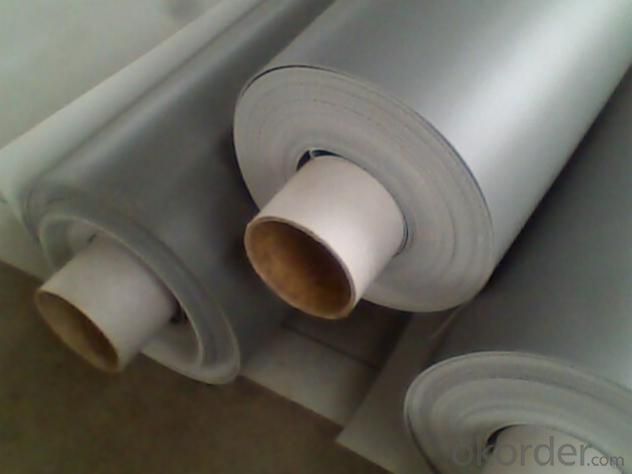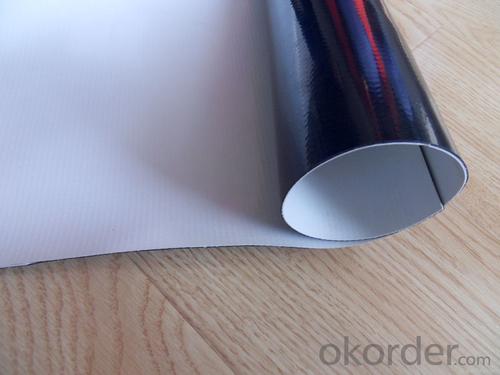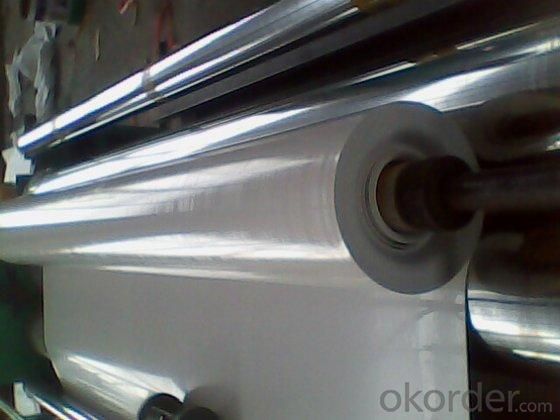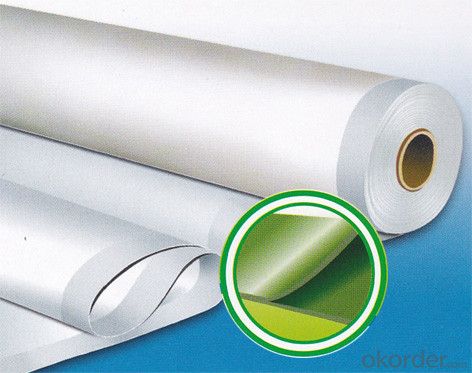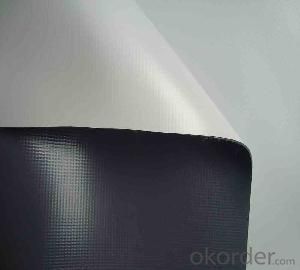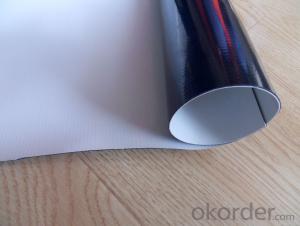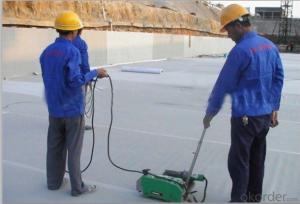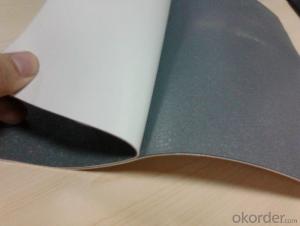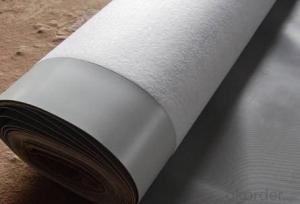PVC Waterproofing Sheet in Polyester Reinforcement in 1.2mm
- Loading Port:
- Shanghai
- Payment Terms:
- TT OR LC
- Min Order Qty:
- 20000 m²
- Supply Capability:
- 5000000 m²/month
OKorder Service Pledge
OKorder Financial Service
You Might Also Like
PVC Waterproofing Sheet in Polyester Reinforcement in 1.2mm
Product Description of PVC Waterproofing Sheet in Polyester Reinforcement in 1.2mm:
PVC Membrane Waterproof /Waterproofing membrane For Roof is a new polymer waterproof membrane. The PVC Membrane Waterproof /Waterproofing membrane For Roof raw material is polyvinyl chloride resin, mixed with plasticizer, filler, antioxygen, ultraviolet absorber and other auxiliaries.
Thickness: 1.2mm/1.5mm/1.8mm/2.0mm
Width:2050mm
Length:20m( Special specifications can be customized)
Size: 2.05mx20m
Color: white/grey, or any other colors.
Features of PVC Waterproofing Sheet in Polyester Reinforcement in 1.2mm:
1. Excellent anti-aging property.
2. Puncture- resistant.
3. Welding construction,
4. High tensile strength, good elongation, good dimensional stability.
5. Good plasticity.
6. It has self-extinguishing from fire property.
7. Materials surface is smooth, fast color, stain resistance.
8. More wide, Wastage become less when being used.
Classification of PVC Waterproofing Sheet in Polyester Reinforcement in 1.2mm:
1. N: Homogeneous PVC membrane
2. L: PVC membrane with fabric backing
3. W: Reinforced PVC membrane
Advantage of PVC Waterproofing Sheet in Polyester Reinforcement in 1.2mm:
1.) Mixing automation. Apply automatic temperature control automatic time control and automatic feed control.
2.) Extrusion equipment uses twin screw coextrusion. Screw temperature uses computer automatic temperature control system.
3.) Handpiece uses large width didhead extrusion equipment.
4.) Sophisticated three-roller calender equipment. The space between equiment is controlled by automation system.
Technical Data of PVC Waterproofing Sheet in Polyester Reinforcement in 1.2mm:
No. | Item | Model Ⅱ | |
1 | Tensile Strength Mpa ≥ | 12.0 | |
2 | Elongation at break% ≥ | 250 | |
3 | Shrinkage rate % ≤ | 2.0 | |
4 | Flexibility at low temperature | No crackle at -25oC | |
5 | Water tightness | Watertight | |
6 | Puncture resistance | Watertight | |
7 | Heat aging treatment | Appearance | Free from bubble, crack, cohesion and void |
Change rate of tensile strength % | +20oC | ||
Change rate of elongation at break | |||
Flexibility at low temperature | No crack at -20oC | ||
8 | Chemical corrosion resistance | Change rate of tensile strength % | +20 |
Change rate of elongation at break | |||
Flexibility at low temperature | No crack at -20oC | ||
9 | Artificial weathering | Change rate of tensile strength % | +20 |
Change rate of elongation at break | |||
Flexibility at low temperature | No crack at -20oC | ||
Application of PVC Waterproofing Sheet in Polyester Reinforcement in 1.2mm:
1) All kinds of roofs, such as steel structure roof, planted roof etc.
2) Underground engineering, such as building basement, subways, tunnels, air raid shelter, etc.
3) Other projects like artificial lake, dam, water reservoir, grain storehouse, etc.
Images of PVC Waterproofing Sheet in Polyester Reinforcement in 1.2mm:
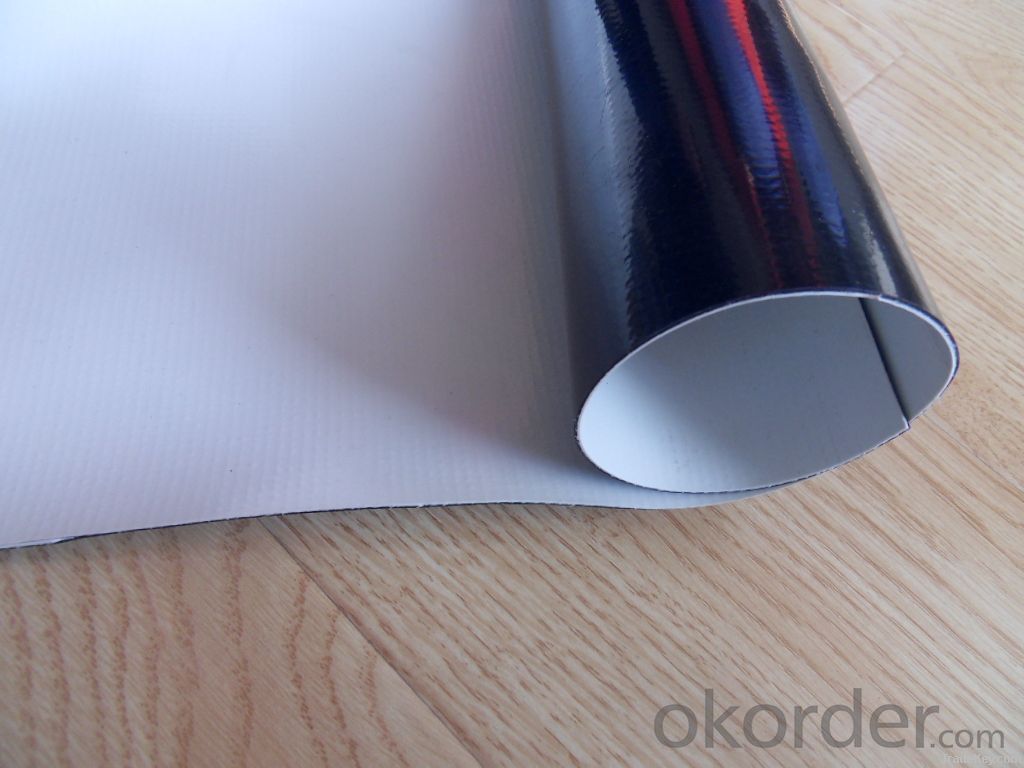
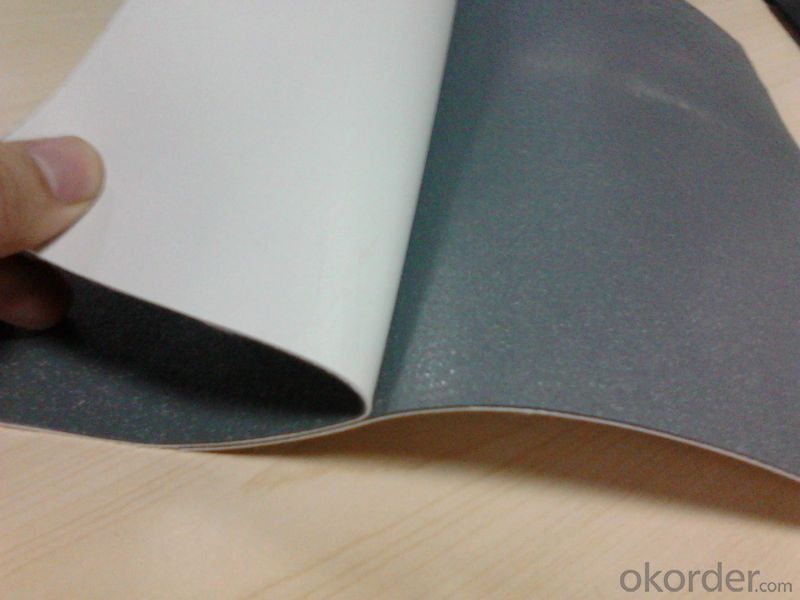
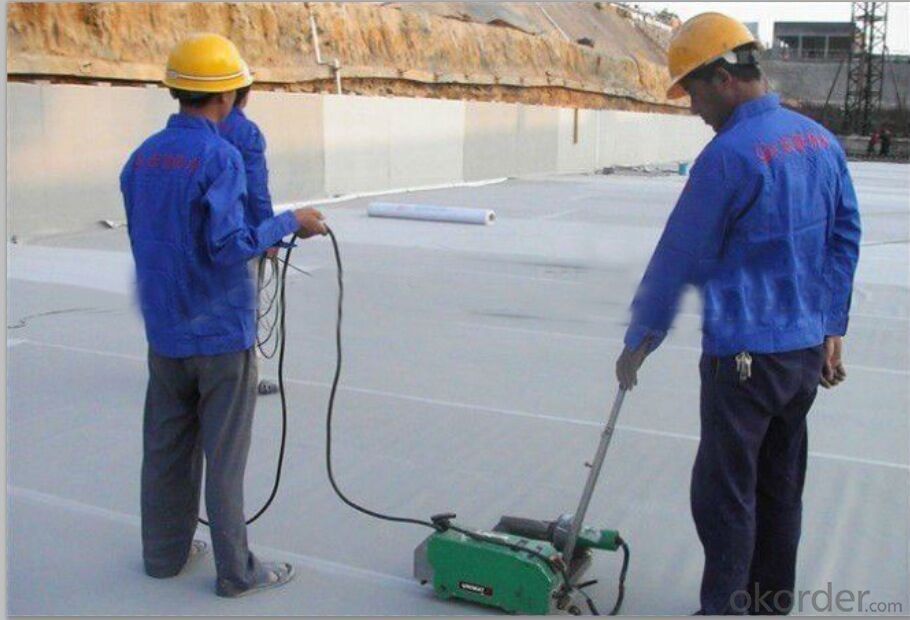
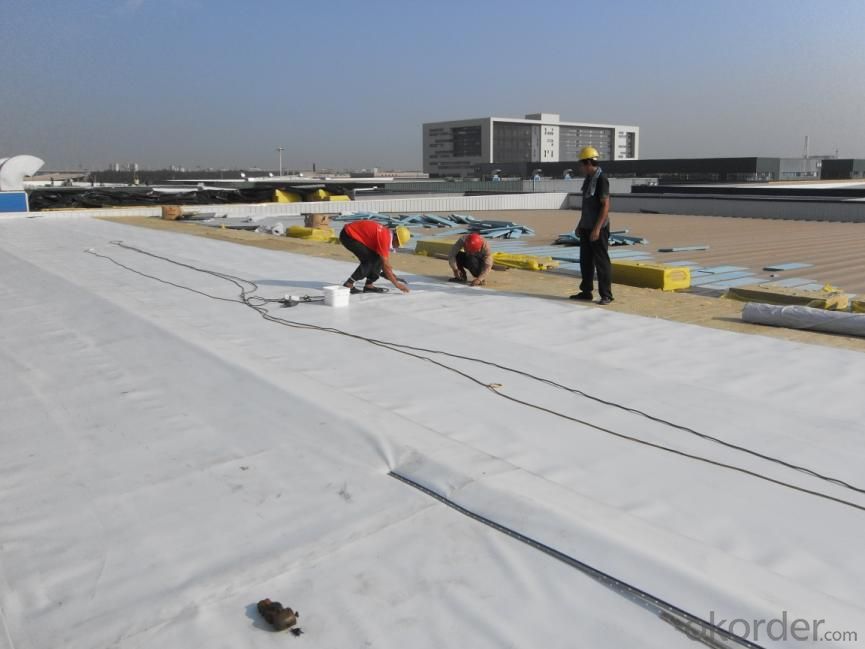
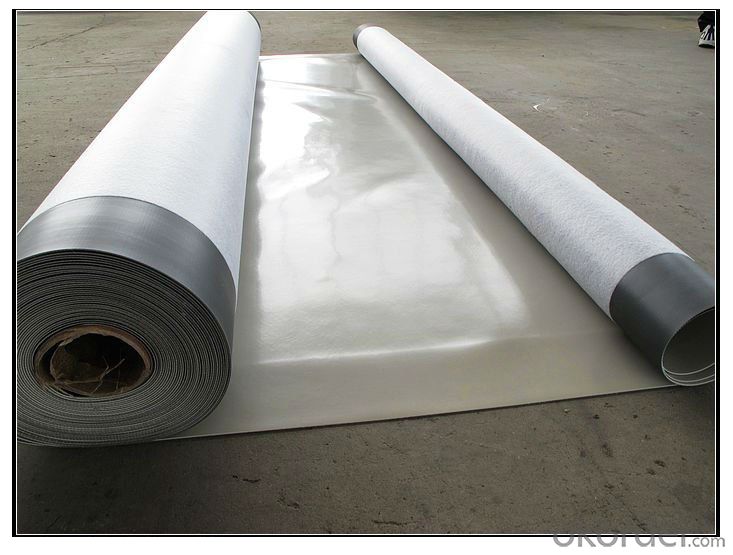
FAQ:
1. Can you produce 4m width?
Yes, no problem for us. We have four bases in China, largest one in this field.
2. How many quantity in one 20'' container for 1.2mm and 1.5mm?
480rolls, 11520m2 for 1.2mm and 400rolls, 9600m2 for 1.5mm
3. Can you provide free samples?
Yes, our samples are free, but express fees usually on buyer's account.
- Q: Can a waterproofing membrane be used in conjunction with tile or stone installations?
- Yes, a waterproofing membrane can be used in conjunction with tile or stone installations.
- Q: Are waterproofing membranes resistant to freeze-thaw cycles?
- Yes, waterproofing membranes are generally resistant to freeze-thaw cycles. These membranes are designed to withstand extreme weather conditions, including freezing temperatures and the subsequent thawing process. The materials used in waterproofing membranes are often chosen for their durability and ability to expand and contract without compromising their waterproofing properties. This resistance to freeze-thaw cycles ensures that the membranes remain intact and effective in preventing water penetration, even in areas where temperature fluctuations occur frequently.
- Q: Can a waterproofing membrane be used for a roof?
- Yes, a waterproofing membrane can be used for a roof. Waterproofing membranes are specifically designed to provide a barrier against water penetration, making them an ideal choice for protecting roofs from leaks and water damage. They are durable, flexible, and can be applied to various types of roofs, including flat and sloped surfaces.
- Q: Can a waterproofing membrane be used for a plaza deck waterproofing?
- Yes, a waterproofing membrane can be used for plaza deck waterproofing. Plaza decks are typically exposed to the elements, including rain and snow, and require a waterproofing system to prevent water infiltration and potential damage to the structure below. Waterproofing membranes are designed specifically for this purpose, offering a barrier against water and protecting the deck from moisture-related issues such as leaks, deterioration, and mold growth. These membranes are typically made from materials such as bitumen, PVC, or EPDM, and are applied in multiple layers to ensure a durable and watertight seal. By using a waterproofing membrane, plaza decks can effectively maintain their structural integrity and longevity.
- Q: Can a waterproofing membrane be used for a shower pan liner installation?
- Indeed, the utilization of a waterproofing membrane is possible for the installation of a shower pan liner. This specialized membrane is specifically crafted to establish a formidable defense against moisture and thwart any infiltration of water into the shower pan, thereby averting any potential harm to the underlying structure. The presence of a dependable and efficient waterproofing system is absolutely crucial in order to ensure the durability and soundness of the shower installation. By effectively sealing the shower pan and establishing an impermeable barrier, a waterproofing membrane can bestow this much-needed protection. It is imperative to select a membrane that is explicitly designed for deployment as a shower pan liner and to diligently adhere to the manufacturer's instructions for proper installation.
- Q: Can a waterproofing membrane be used on retaining walls?
- Using a waterproofing membrane on retaining walls is possible. Retaining walls often face moisture and hydrostatic pressure, which can result in water infiltration and structural decay. By applying a waterproofing membrane to the retaining wall, water penetration can be prevented, shielding the wall from moisture-related harm and extending its lifespan. The membrane acts as a barrier, stopping water from seeping into the wall and causing problems like efflorescence, cracks, or erosion. It is crucial to select a waterproofing membrane that is designed specifically for below-grade applications and can withstand the pressure exerted by the soil being retained. Moreover, proper installation techniques and suitable drainage systems should be taken into account to ensure the effectiveness of the waterproofing membrane on retaining walls.
- Q: Are waterproofing membranes suitable for underground parking garages?
- Yes, waterproofing membranes are suitable for underground parking garages. They provide an effective barrier against water infiltration, preventing damage to the structure and protecting against potential leaks and moisture-related issues. Waterproofing membranes are designed to withstand the high water pressure typically associated with underground environments, making them an ideal solution for ensuring the longevity and durability of underground parking garages.
- Q: Can a waterproofing membrane be used in crawlspaces or basements?
- Using a waterproofing membrane in crawlspaces or basements is highly recommended. These areas are prone to water seepage and high humidity levels, which can cause mold growth, structural issues, and damage to stored items. By effectively sealing the foundation walls and floor, a waterproofing membrane acts as a barrier against water intrusion. It creates a watertight seal that keeps the space dry and protected. Furthermore, waterproofing membranes help control moisture levels by reducing condensation and humidity, creating a healthier and more comfortable environment. Overall, using a waterproofing membrane in crawlspaces or basements is crucial for ensuring the structure's longevity and integrity and protecting against potential water-related problems.
- Q: Are waterproofing membranes flexible?
- Yes, waterproofing membranes are typically flexible. They are designed to be pliable so that they can conform to the shape and movement of the surfaces they are applied to. This flexibility allows the membranes to effectively seal gaps, cracks, and joints, preventing water from infiltrating into the underlying structure. Furthermore, the flexibility of waterproofing membranes also enables them to withstand the expansion and contraction that occurs due to temperature changes or structural movements. Overall, the flexibility of waterproofing membranes is a crucial characteristic that ensures their durability and effectiveness in protecting structures from water damage.
- Q: Can a waterproofing membrane be used for a planter box waterproofing?
- Planter box waterproofing can be achieved by utilizing a waterproofing membrane. This specific type of membrane is designed to establish a barrier against water and moisture, effectively prohibiting their penetration through the surface it is applied on. Consequently, it serves as an excellent option for safeguarding the integrity of the planter box and preventing water-related harm. By applying the membrane to the interior of the box, a tight seal is formed, effectively preventing water leakage and damage to surrounding surfaces. Furthermore, the utilization of a waterproofing membrane aids in prolonging the lifespan of the planter box by curbing the growth of mold or mildew, which can be triggered by excessive moisture. In conclusion, opting for a waterproofing membrane for planter box waterproofing is a pragmatic and efficient approach to ensure the long-lasting durability of the structure.
Send your message to us
PVC Waterproofing Sheet in Polyester Reinforcement in 1.2mm
- Loading Port:
- Shanghai
- Payment Terms:
- TT OR LC
- Min Order Qty:
- 20000 m²
- Supply Capability:
- 5000000 m²/month
OKorder Service Pledge
OKorder Financial Service
Similar products
Hot products
Hot Searches
Related keywords
